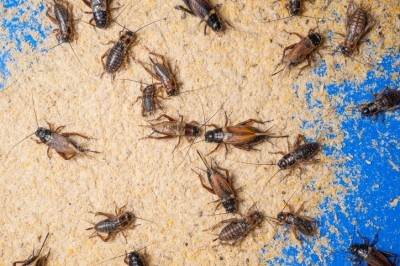The UK’s Novel Foods legislation: A dinosaur stifling innovation or making the best of bad hand?

Over the last 13 years, Brand Relations has been behind the launch and development of over 100 brands in the UK. Horwell has also built up and sold companies of his own in the food and beverage sector. He has over 30 years’ experience in marketing FMCG brands around the world, having lived and worked in the UK, USA, Australia and the Middle East. In the UK’s food and drink industry, he laments, any form of progress or innovation in the is ‘being crushed to a pulp' thanks to a bureaucratic organisation that is no longer fit for purpose.
“While British entrepreneurs are, in my opinion, being ripped off to the tune of hundreds of thousands of pounds to get their products approved, other countries have quickly moved into pole position,” he said.
Listing the likes of CBD oil, hemp, monk fruit and lion’s mane and turkey tails mushrooms, he complained the US and Canada are “finding themselves at the vanguard of a revolution which has resulted in a booming appetite for food products containing novel foods with health benefits”.
In the UK in March 2021, however, only 210 applications from several thousand products were considered viable for further consideration, claimed Horwell. “Since COVID 19 there has been a surge in the demand for healthy food and plant-based products,” he said. “So many people are coming through my door wanting to use natural health foods in their products, but I have to tell them it can’t be done. It’s not allowed until they have gathered and submitted extensive evidence to the FSA.”
Not only that, the process is expensive and lengthy. “The cost of launching a novel food is astronomical and out of the reach of most small businesses,” protested Horwell. “Think at least five or six figures for testing and research. If you are lucky, you will only have certain limitations about how much of your chosen ingredient you can use. But you will still probably have to wait years to be able to sell your product.”
CBD bottlenecks
Take the meandering CBD Novel Foods approvals saga in the UK by way of an example. After Brexit, the industry was given a deadline of 31 March 2021 to submit Novel Food applications for CBD products on the market, after which a public list of CBD products permitted for sale to consumers would be released.
That list has not been updated since April last year. The CBD sector had hoped that the public list of CBD products would be released early in 2022. This timescale now looks unlikely. The FSA says it is still working through the applications and can't say when its list of validated products might be published.
The UK’s CBD industry had hoped Brexit would be an opportunity to make the UK leader in the field, where a safe, legal and regulated industry would be pioneered. The mood now is frustration, however. It fears a loss of confidence in the Novel Foods process. Many CBD brands are complaining that after spending up to a quarter of a million pounds to submit dossiers and toxicological data and play by the rules, retailers won't do anything to promote their products until the FSA list has been updated.
But the appetite for CBD in food and drink is currently booming, claimed Horwell. Major retailers Boots and Holland & Barrett reported an increase of 65% in revenue in November 2021 from CBD products and they are set to pull in £690 million in 2021 – an increase of £314 million since 2019. Consumers therefore might be surprised to learn that the FSA is still reviewing applications.
Of course we should be cautious about what goes into our food, stressed Horwell. But in most cases these health products have already been tested, he claimed. “Canada has approved more than 90 Novel Foods including canola, corn, cotton seed and flax. Many products are already on sale in the USA. If we’re going to be trading with America why isn’t this good enough for us? Our laws say everything new has to be tested but if it is already tested (elsewhere or in different products, say supplements) and it’s not making anyone sick, what’s the problem? We need to free ourselves from the bureaucrats.”
A host of other ingredients are bottlenecked in bureaucratic quagmire, believes Horwell. Recent trends for Krill oil, chia seeds, noni-fruit juice and baobab have resulted in an 'insatiable demand' for these perceived healthy plant-based foods, he said. “But they are all currently lounging in a very deep novel foods pit, awaiting the green light from the FSA which says these all have to be tested as safe and properly labelled and cannot be legally sold until authorised.”
This might make sense if millions of people in the UK weren’t already consuming these products freely in the form of supplements, he added. “There are no restrictions regarding vitamins for personal use. That leaves the consumer in the ludicrous position of being able to take whatever they like freely alongside their food – they just can’t have the same supplement in their food. It makes no sense at all.”
Rules vs creativity?
While too many rules can stifle creativity, too few can lead to food safety scandals. Innovations require more risks, meanwhile, which means more controls and regulation. But while Horwell believes the pendulum has swung far too in favour of the latter – he called the FSA an “outmoded, dinosaur of an organisation” – others defend the organisation.
"The FSA aren't the bad guys... they're on our side and doing the best for the sector,” said Nick Rousseau from the Woven Network, the representative of the UK’s up-and-coming and innovative edible insect sector which in December submitted a Novel Foods dossier to the FSA for Acheta Domesticus, or house crickets. He expects the process to take around 18 months after which consumers will be able to enjoy a “delicious, nutritious, highly versatile and sustainable alternative source of protein”.
Tellingly, the FSA has issued a call for consultants (based on a report on food innovation carried out for the FSA by Cambridge University) to help it understand different regulation food environment models around the world, suggesting the Novel Foods process – which after was directly duplicated from Brussels to the UK after Brexit – needs improvement, and that it wants ideas. We must also consider the pandemic, which has left many in the sector under resourced.
“They've been lumbered with Novel Foods from Brussels and are trying to make the best fist of it," Rousseau believes.
























